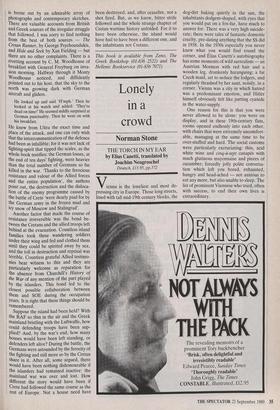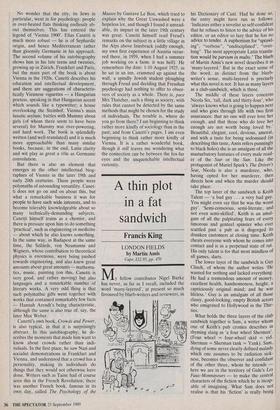Lonely in a crowd
Norman Stone
THE TORCH TN MY EAR by Elias Canetti, translated by Joachim Neugroschel
Deutsch, £13,95, pp.372
Vienna is the loneliest and most de- pressing city in Europe. Those long streets, lined with tall mid-19th century blocks, the dog-dirt baking quietly in the sun, the inhabitants dodgem-shaped, with eyes that you would put on a fox-fur, have much to answer for. There was a very high suicide- rate; there were tales of fantastic domestic cruelty, pre-dating anything that the SS did in 1938. In the 1930s especially you never knew what you would find round the corner, and Elias Canetti's autobiography has some moments of wild surrealism — an Austrian Mormon with red hair and a wooden leg, drunkenly haranguing; a fat Czech maid, set to seduce the lodgers, and regularly thrashed by her aunt, noisily, in a corner. Vienna was a city in which hatred was a predominant emotion, and Hitler himself obviously felt like putting cyanide in the water-supply.
One reason for this is that you were never allowed to be alone: you were on display, and in these 19th-century flats, rooms opened endlessly into each other, with chairs that were extremely uncomfort- able, managing at the same time to be over-stuffed and hard. The social customs were particularly excruciating: thin, acid white wine and cinq-d-sept canapes with much glutinous mayonnaise and pieces of cucumber; forcedly jolly polite conversa- tion which left you bored, exhausted, hungry and head-ached — not anxious to eat any more, but also unable to sleep. The list of prominent Viennese who tried, often with success, to end their own lives is extraordinary.
No wonder that the city, its Jews in particular, went in for psychology: people in over-heated flats thinking endlessly ab- out themselves. This has entered the legend of 'Vienna 1900'. Elias Canetti is much more robust — he is of Sephardic origin, and hence Mediterranean rather than gloomily Germanic in his approach. The second volume of his autobiography shows him in his late teens and twenties, growing up in Zurich, Frankfurt and Paris, but the main part of the book is about Vienna in the 1920s. Canetti describes his education and intellectual development, and there are suggestions of characteris- tically Viennese vignettes — a Hungarian poetess, speaking in that Hungarian accent which sounds like a typewriter; a house overlooking the Steinhof, Vienna's main lunatic asylum; battles with Mummy about girls (of whom thefe seem to have been several) for Mummy was over-powering, and hard work. The book is splendidly written (and well-translated) and it is much more approachable than many similar books, because, in the end, Latin clarity and wit play as great a role as Germanic convolution.
But there is also an element that emerges in the other intellectual biog- raphies of Vienna in the later 19th and early 20th centuries. These people were polymaths of astounding versatility. Canet- ti does not go on and on about this, but what a remarkable business it was for people to have such wide interests, and to become tolerably knowledgeable about so many technically-demanding subjects. Canetti himself trains as a chemist, and there is pressure upon him to do something 'practical', such as engineering or medicine — about which he also knows something. In the same way, in Budapest at the same time, the Szilards, von Neumanns and Wigners, whose contribution to theoretical physics is enormous, were being pushed towards engineering, and also knew great amounts about great amounts — mathema- tics, music, painting (on this, Canetti is very good, and rather moving) but also languages and a remarkable number of literary works. A very odd thing is that such polymathic gifts went together with works that contained remarkably few facts — Hannah Arendt's being characteristic, although the same is also true of, say, the later Max Weber.
Canetti's own book, Crowds and Power, is also typical, in that it is surprisingly abstract. In this autobiography, he de- scribes the moments that made him want to know about crowds rather than indi- viduals. In the first place, he saw Nazi and socialist demonstrations in Frankfurt and Vienna, and understood that a crowd has a personality, making its individuals do things that they would not otherwise have done. Writers such as TaMe had of course seen this in the French Revolution; there was another French book, famous in its own day, called The Psychology of the Masses by Gustave Le Bon, which tried to explain why the Great Unwashed were a hopeless lot, and though I found it unread- able, its impact in the later 19th century was great. Canetti himself read Freud's remarks on the subject in a little village in the Alps above Innsbruck (oddly enough, my own first experience of Austria occur- red there, in 1959, when I had a summer job working on a farm: it was hell). He remembers the date: 1-10 August 1925, as he sat in an inn, crammed up against the wall, a spindly Jewish student ploughing through Freud and deciding that Freudian psychology had nothing to offer to obser- vers of society as a whole. There is, pace Mrs Thatcher, such a thing as society, with rules that cannot be detected by the same methods that might be chosen for the study of individuals. The trouble is, where do you go from there? I am beginning to think rather more kindly of sociology than in the past; and from Canetti's pages, I am even beginning to think rather more kindly of Vienna. It is a rather wonderful book, though it still leaves me wondering what the connection can be between the fox-fur eyes and the unquenchable intellectual curiosity.



























































 Previous page
Previous page